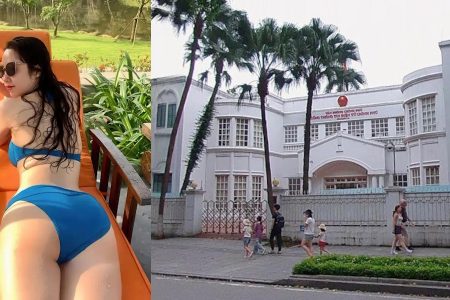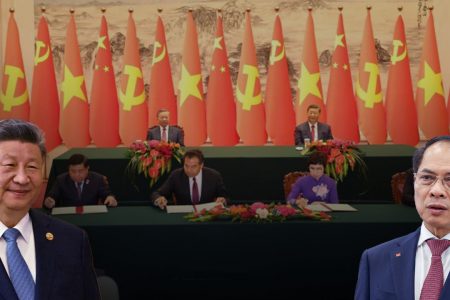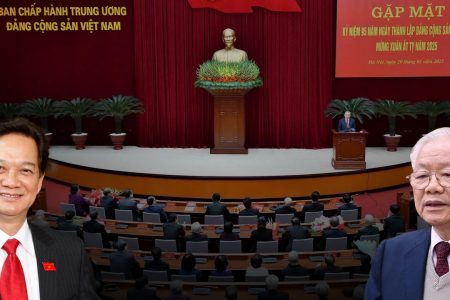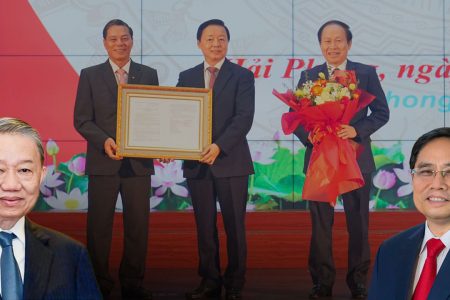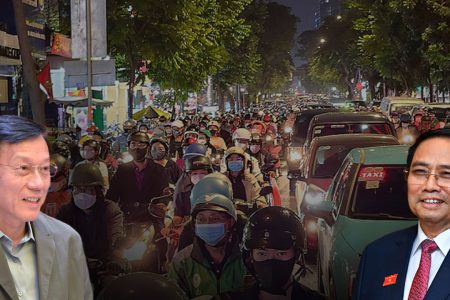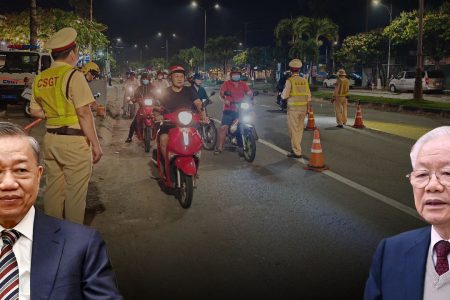
The recent case of an 8-year-old girl being abused to death by her father’s mistress in Vietnam is causing public outrage and voices have emerged that say this case shows the need to be more public about human rights in children as well as in the whole population.
Vietnamese newspapers reported on December 28 that police in Binh Thanh District, Ho Chi Minh City, detained and probed a 26-year-old woman named Vo Nguyen Quynh Trang on charges of “torturing others.”
Previously, on December 22, Trang was accused by other people of beating to death an 8-year-old girl who is the child of a 36-year-old man living as husband and wife with her.
Local media quoted witnesses as reporting that on the afternoon of December 22, they heard the girl screaming and being beaten at the apartment where she lived with his father and Mrs. Trang. Witnesses added that there were signs that the child had been abused several times before.
It was reported that on the evening of the same day, the baby was taken to the hospital but she died before arriving. “Examining the body, the doctor noted that the baby had large bruises all over the body, in addition to the old and patched wounds on the face. From those injuries, the authorities suspect that the baby was beaten to death,” Tuoi Tre newspaper said.
On social networks, flooded with public condemnations against Ms. Vo Nguyen Quynh Trang, they used words such as “cruel“, “barbaric“, “evil beast” … to talk about her. Many people heavily criticized the man who is the baby’s father and the lover of Mrs. Trang. They believe that this man should also be probed because he either abetted Ms. Trang or ignored and did not report the crime.
Another equally remarkable line of opinion points out that Vietnamese society is an environment for violence while people seem to be increasingly indifferent and insensitive to each other.
Also giving his opinion on the case that is causing both pain and indignation, veteran journalist Huynh Ngoc Chenh noted the need to disseminate human rights knowledge to the entire population and educate children about human rights.
Writing on his personal page with nearly 100,000 friends and followers, Mr. Chenh, also known as a social progress activist, points to the fact that in many other countries children are taught human rights from a very young. preschool age.
“The first and concrete right that children are taught is the right not to be hurt and not to hurt others… Then from there, no one has the right to touch their bodies to cause pain, including parents“, Mr. Chen wrote.
In addition, the children are also taught how to call for help to the right people when needed. In Mr. Chenh’s perspective, his 8-year-old granddaughter, who was beaten to death in Ho Chi Minh City, was not taught about human rights and how to protect her human rights and ended up becoming a victim.
On the other hand, Mrs. Trang “was not taught human rights from a young age, so she casually violated the baby’s body without seeing it wrong“, Mr. Chenh made an observation.
About the father of the ill-fated child, the veteran journalist commented that the man “was not taught human rights since childhood, grew up and worked in a society where the two words human rights were not mentioned often. It’s like hearing about something horrible, so you don’t understand a very basic thing that you don’t have the right to hurt your child and no one is allowed to hurt your child.”
Generalizing the situation in Vietnam from a specific case, journalist and activist Huynh Ngoc Chenh wrote: “Human rights are hidden, the law conceals the progress that the world is forced to record, The tragedy that continues to happen to the people of Vietnam is inevitable.”
Ms. Huong Luong, who is married and has two sons in the US, shares similar views on the need and importance of education on basic human rights for children.
Now living in the city of Bethesda bordering Washington, D.C., with her children in grades 2 and 6, Huong described to VOA how American schools teach and monitor children’s rights:
“When children do not know how to express themselves, from beginner to third grade, they assign the responsibility to the homeroom teacher. For example, it is very cold and a child is not warmly dressed, they will ask their parents to come to see them. Whether the kids don’t have lunch at noon, or the parents don’t register to buy lunch at school, they will work with the family. The homeroom teacher will observe the child daily very closely. If they see a child’s body with marks of being beaten, they will report it to the police immediately.”
In that case, the police or social services will work with the family, Huong said. For children with abnormal psychological signs, the school has a psychologist to talk to the children.
Ms. Huong continued on how the school provides knowledge about rights to children who are older and able to express their opinions:
“From grade 3 onwards, children are educated by pictures. Children are educated about approaching strangers, about telling teachers when they are hurt or beaten at home. In grade 5, children are taught about physical harassment and sexual harassment. They inform the children that if they cannot eat, wear clothes, or get hurt… they can talk to their teachers or school counselors.”
With practical experience, Ms. Huong said that the school’s psychologist is very interested and knows how to talk to the children like family members, so they understand the children’s circumstances.
In a residential area, although Ms. Huong has never seen such violence against children that neighbors or the authorities have to intervene, she has directly seen a person yell at a child and immediately have a neighbor. expressed displeasure about that behavior, and threatened to report it to the police.
“In general, parents are always observed by the school and the community,” Ms. Huong commented.
She also noted that, under US law, it is also a crime for parents to accidentally or intentionally leave young children at home alone or wandering on the street, in parks…. “The responsibility of adults to protect their children is very high,” said Ms. Huong.
She added that most adults in America take on the responsibility of protecting a child on their own. “If they don’t directly intervene, they quietly report to the police,” said Ms. Huong.
An overview of US law on the behavior of parents when teaching their children, Ms. Huong said:
“The form of parenting that causes harm to the child’s body, for example, is a crime of the parents. The law in the US is very clear. I think Vietnam needs to be more clearly defined about parental rights, children’s rights, and to what extent they teach children to prevent child abuse in Vietnam.”
In his article, journalist and activist Huynh Ngoc Chenh calls for: “From now on, teach your children and grandchildren about the right to be human, the right not to let anyone touch your body, including their parents, know how to react and protect themselves when being violated by others.”
Mr. Chenh concluded that: “When your children are imbued with human rights from a young age, they will not infringe upon the human rights of others when they grow up, they will not become evil stepfathers or stepmothers, being a police officer will not beat people to death in the station, being a soldier does not torture new soldiers.”
Thoibao.de (Translated)



